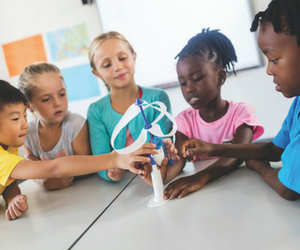NAGC works to support those who enhance the growth and development of gifted and talented children through education, advocacy, community building, and research
Deborah Reber
One of the things parents raising gifted children deal with daily, but many others don't understand, are the very real challenges stemming from asynchronous development of these unique learners. After all—how does one grapple with supporting a ten year old who reads at the college level but is lagging in social emotional skills? For parents of twice-exceptional children, sometimes one’s child’s challenges are all we and the world sees. For most of us, it requires letting go of preconceived time lines about what our kids should be doing and when. The reality is, they are on their own schedule and often the best thing we can do is honor and respect where they're at and allow them to grow at their own pace.
The Importance of Measuring Up
 From the moment a child is born, the measuring begins. Apgar scales, growth and development charts, key developmental milestones. Once kids hit the school years, the measuring never really ends. There are IQ tests, standardized tests, teacher assessments, grades… even the Presidential Fitness Test. Then there are countless academic, cognitive, and social markers, everything from learning to read or mastering riding a two-wheeler to being mature enough to stay home alone or knowing how to cook breakfast by themselves. These all have the potential to be points of pride for parents, an opportunity for them to tick off the box and feel secure that they’re doing a good job. And even though the information gleaned from assessments and milestones can be useful, there is a downside to all of this measuring—namely, getting caught up with worry and concern when our child isn’t measuring up.
From the moment a child is born, the measuring begins. Apgar scales, growth and development charts, key developmental milestones. Once kids hit the school years, the measuring never really ends. There are IQ tests, standardized tests, teacher assessments, grades… even the Presidential Fitness Test. Then there are countless academic, cognitive, and social markers, everything from learning to read or mastering riding a two-wheeler to being mature enough to stay home alone or knowing how to cook breakfast by themselves. These all have the potential to be points of pride for parents, an opportunity for them to tick off the box and feel secure that they’re doing a good job. And even though the information gleaned from assessments and milestones can be useful, there is a downside to all of this measuring—namely, getting caught up with worry and concern when our child isn’t measuring up.
As parents, we like to know where our child fits in. We want to know our child is progressing nicely, that there are no barriers to their developing into capable, successful adults. Formal metrics are an easy way to get information quickly. But when a child is developing differently, the urge to compare (and despair) can be overpowering. It’s critical that those of us raising atypical kids honor our child’s unique time line so they can become secure in who they are.
We live in a society preoccupied with deficits as opposed to strengths, a tendency on display in schools that typically identify areas of weakness and teach to those. Your child is an incredible writer, but she struggles in math, so we’re going to give her more math. In a traditional education model, once a child’s deficits are identified, school becomes about “fixing” those, their strengths all but ignored. Historically it’s always been about “fixing what’s wrong” rather than leaning in to what’s right and using that as a foundation for engaging a child’s gifts. But when we focus on weaknesses, we miss out on so much. And our kids pay the price.
The Problem With Arbitrary Time Lines
One of the things I hear all the time is that kids need to know how to work collaboratively, that being able to navigate small-group situations is a key predictor of future success. In fact, the most common question I get from non-homeschooling parents is the classic But how will he learn social skills? I know, then, inquiries about how my son, Asher, will master working in a group aren’t far behind.
I admit to having pangs of insecurity when that question comes up. After such an exchange I might even frantically research summer programs where Asher can work on developing those skills, and pronto. This despite the fact that group situations are a recipe for disaster for Ash and have always presented the biggest challenges for him.
It’s not easy to know what’s best in situations like these, but I do know that when we push our children to do things they’re truly not ready for, it never ends well.
Pushing children to do more than they’re ready for has the potential to crush their self-worth, result in lost confidence, cripple them with pressure to succeed, and even turn them against whatever we’re trying to get them to learn.
Respecting Unique Time Lines Benefits Kids
I realized pushing Asher into group situations wasn’t worth the emotional toll. I know that the more time Asher can spend feeling calm and regulated, the more room he has to become self-aware, confident, and secure, which will ultimately help him learn how to behave in a group.
Every child learns differently and follows their own perfect time line. A recent study by the Bill and Melinda Gates Foundation found that when students are given the opportunity to learn at their own pace and in their own way. Math and reading scores rose significantly using this method and had an impact larger than those found in 95% of other educational intervention studies.
Why? Because children learn best when they feel secure and confident in their abilities. They feel safer taking risks and they are more resilient when they have setbacks. Respecting our child’s unique time lines gives them a chance to strengthen their wings and trust in themselves before they have to fly. And because they’re growing up in a world where their neurodivergence may not always be appreciated, keeping their self-worth intact by reinforcing the idea that they’re right where they should be will pay off.
Notice the Compare-and-Despair Cycle
 If we want to respect where our children are, we have to first recognize when we’re being triggered by where they aren’t. One hotbed of fodder for unhelpful comparisons is, of course, Facebook, where time lines tell picture-perfect tales of sporting victories, enviable achievements, and ideal lives. But comparing (and inevitably despairing) can happen in any environment. Here in the Netherlands, I have to confront my own compare-and-despair tendencies the moment I step outside my front door, because kids Asher’s age are biking solo to and from school and to friends’ houses, having full run of the city and living incredibly independent lives. I love this about the Netherlands and that’s totally not where we are right now, at this moment.
If we want to respect where our children are, we have to first recognize when we’re being triggered by where they aren’t. One hotbed of fodder for unhelpful comparisons is, of course, Facebook, where time lines tell picture-perfect tales of sporting victories, enviable achievements, and ideal lives. But comparing (and inevitably despairing) can happen in any environment. Here in the Netherlands, I have to confront my own compare-and-despair tendencies the moment I step outside my front door, because kids Asher’s age are biking solo to and from school and to friends’ houses, having full run of the city and living incredibly independent lives. I love this about the Netherlands and that’s totally not where we are right now, at this moment.
Asher may be able to explain the theory of relativity, but safely cross the street on his own? Not so much. Will Asher ever learn to do that? Of course. Will he eventually be able to bike around the city on his own? I’m certain of it. Does he need to know how to do those things right now? Definitely not. He’s working on his own things in his own time. For now, we’ll continue to help him develop his confidence and awareness. And eventually he’ll get there.
So—what are the things that trigger you? Where do you think your child “should” be that he or she is not? What specific actions or activities do you think your child should have mastered by now? I encourage you to reflect on this question and make a list. Because chances are, even if you’re not actively pushing your child to master said ability, that child may sense that he or she isn’t living up to your expectations.
Challenge Those Time Line Beliefs
Once you’ve identified areas where you believe your child is behind, challenge those assumptions and, even more important, consider ways you may be “awfulizing” or having a doom-and-gloom perspective about any delayed time line. Are you, like I was, making your child’s straying from the “expected” time line mean that their future dreams are shot? Or are you convinced that if they don’t learn how to do something now, they’ll never learn it? Consider some of the areas where you’re concerned and explore these two questions.
When we noodle on these questions, we typically find that the answer to that last one is Not much. Who cares if our child wears Velcro sneakers until they’re sixteen? Will his quality of life suffer for it? What’s the big deal if our kid can’t bike independently to a friend’s house or run to the store by the age of thirteen? She’ll be able to do it in her own time. When children are ready, they can not only learn something much more quickly, but feel proud of their new skill or ability.
Before I move on, I want to acknowledge that some developmental time line concerns, especially ones relating to that scary concept otherwise known as the future, can feel too important to let go of. If that’s the case for you, consider how you might be enmeshed in the expectations you have for your child rather than honoring and respecting that they are on their own unique journey. I like the way Julie Lieberman, founder of Mother’s Quest and host of the Mother’s Quest podcast, summed it up in a recent interview, “We don’t know what the future holds, but what we do know and what we can focus on now is how we can help Ryan just become the best Ryan he can be and what do I need to do to just help him live to his fullest potential. I can get out of focusing on the future and become more present and enjoy all of the great qualities he has already. And then I can ask where do we need to get support to help him grow?”
Talk Openly About Time Lines
 Because differently wired kids are often highly in tune with not only us, but the world around them (even when it may seem as though they’re not paying attention at all), many are hyperaware of where they net out in comparison with their peers. This is especially true for gifted children, many of whom are extraordinarily tough on, and have extremely high expectations of, themselves. It’s important to talk with children about personal time lines as a way to celebrate their strengths, as well as bring up areas where they may want to work on developing their skills.
Because differently wired kids are often highly in tune with not only us, but the world around them (even when it may seem as though they’re not paying attention at all), many are hyperaware of where they net out in comparison with their peers. This is especially true for gifted children, many of whom are extraordinarily tough on, and have extremely high expectations of, themselves. It’s important to talk with children about personal time lines as a way to celebrate their strengths, as well as bring up areas where they may want to work on developing their skills.
Start by pointing out areas where they’re excelling and doing really well, perhaps even ahead of their peers, and not just in academics or cognitive areas, but also in character strengths. Often, such strengths are overlooked when, really, they are the foundation on which all growth can occur. Dr. Robyn Silverman suggests, “I would challenge people to relabel their children in their own heads based on strengths. How do you talk about your child? You want to surround your kids and yourself with the type of people who see your kids for their strengths. And you want to talk about your own shortcomings and what you did to work on them, too.”
Be Prepared to Deflect the Doubters
Be prepared for the questions or comments we all know will come from doubters to help us respond to them with confidence instead of defensiveness, hurt, or embarrassment. In turn, that confidence influences how our child’s differences are seen, absorbed, and understood by others, not because we care what they think about us or our child, but because we’re doing the very important, paradigm-shifting work of challenging the stigmas that surround different ways of being.
Start Now
Make a list of skills your child is struggling with, and commit to working with your child to improve on these skills with love, patience, and no preconceived time line.
Deborah Reber is a bestselling author, certified life coach, and speaker. She is the mother of a twice-exceptional son and experiencing the heartaches, headaches, confusion, and unexpected gifts that is typical for parents raising these exceptional kids. Deborah launched TiLT Parenting in April 2016, where she is building a community of supportive parents of neurodiverse children.
Editor's Note: This post is an abridged excerpt from Differently Wired: Raising an Exceptional Child in a Conventional World by Deborah Reber (Workman Publishing). Copyright © 2018.